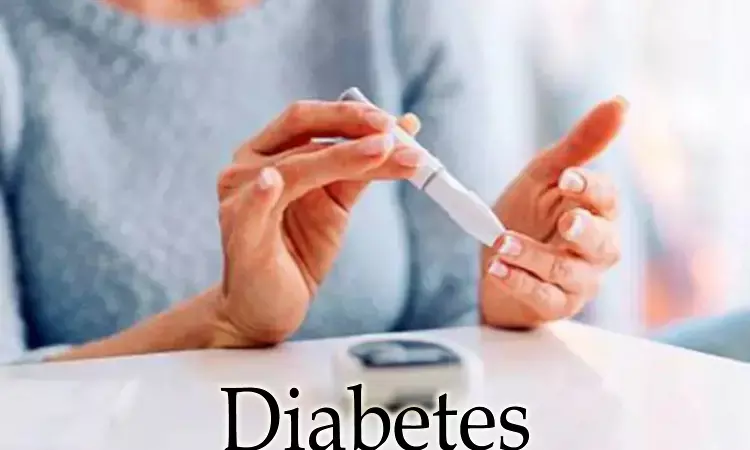- Home
- Medical news & Guidelines
- Anesthesiology
- Cardiology and CTVS
- Critical Care
- Dentistry
- Dermatology
- Diabetes and Endocrinology
- ENT
- Gastroenterology
- Medicine
- Nephrology
- Neurology
- Obstretics-Gynaecology
- Oncology
- Ophthalmology
- Orthopaedics
- Pediatrics-Neonatology
- Psychiatry
- Pulmonology
- Radiology
- Surgery
- Urology
- Laboratory Medicine
- Diet
- Nursing
- Paramedical
- Physiotherapy
- Health news
- Fact Check
- Bone Health Fact Check
- Brain Health Fact Check
- Cancer Related Fact Check
- Child Care Fact Check
- Dental and oral health fact check
- Diabetes and metabolic health fact check
- Diet and Nutrition Fact Check
- Eye and ENT Care Fact Check
- Fitness fact check
- Gut health fact check
- Heart health fact check
- Kidney health fact check
- Medical education fact check
- Men's health fact check
- Respiratory fact check
- Skin and hair care fact check
- Vaccine and Immunization fact check
- Women's health fact check
- AYUSH
- State News
- Andaman and Nicobar Islands
- Andhra Pradesh
- Arunachal Pradesh
- Assam
- Bihar
- Chandigarh
- Chattisgarh
- Dadra and Nagar Haveli
- Daman and Diu
- Delhi
- Goa
- Gujarat
- Haryana
- Himachal Pradesh
- Jammu & Kashmir
- Jharkhand
- Karnataka
- Kerala
- Ladakh
- Lakshadweep
- Madhya Pradesh
- Maharashtra
- Manipur
- Meghalaya
- Mizoram
- Nagaland
- Odisha
- Puducherry
- Punjab
- Rajasthan
- Sikkim
- Tamil Nadu
- Telangana
- Tripura
- Uttar Pradesh
- Uttrakhand
- West Bengal
- Medical Education
- Industry
Immune response to insulin could identify, help treat those at risk for Type 1 Diabetes

AURORA, Colo. - Researchers from the Barbara Davis Center for Childhood Diabetes at the University of Colorado Anschutz Medical Campus have found that immune responses to insulin could help identify individuals most at risk for developing Type 1 diabetes.
The study, out recently in the Proceedings of the National Academy of Sciences, measured immune responses from individuals genetically predisposed to developing Type 1 diabetes (T1D) to naturally occurring insulin and hybrid insulin peptides. Since not all genetically predisposed individuals develop T1D, researchers sought to examine T-cell immune responses from the peripheral blood that could occur before the onset of clinical diabetes.
"We want to know why people develop T1D, and this research has helped provide a lot more information and data as to what it looks like when genetically at-risk individuals are headed towards clinical diagnosis," says Aaron Michels, MD, the study's lead researcher, Associate Professor of Medicine at CU Anschutz and researcher at the Barbara Davis Center. "Ideally, you want to treat a disease when it's active, so this is a need in our field to understand when people have an immune response directed against insulin producing cells."
Researchers collected blood samples from genetically at-risk adolescents every 6 months for two years. Inflammatory T-cell responses to hybrid insulin peptides correlated with worsening blood glucose measurements and progression to T1D development. The results indicate an important advancement in identifying the risk of T1D early as well as the potential for intervention.
"There are now therapies used in research studies that have delayed the onset of clinical type 1 diabetes," says Michels. "Patients with these specific immune responses, may benefit from immune intervention to delay T1D onset and possibly prevent it for years."
Furthermore, Michels says these results can lead to research beyond T1D. "Our work focused on diabetes, but this has implications for other autoimmune diseases. Understanding how the immune system responds can be crucial in trying to prevent diseases before clinical symptoms are present."
Hina Zahid Joined Medical Dialogue in 2017 with a passion to work as a Reporter. She coordinates with various national and international journals and association and covers all the stories related to Medical guidelines, Medical Journals, rare medical surgeries as well as all the updates in the medical field. Email: editorial@medicaldialogues.in. Contact no. 011-43720751
Dr Kamal Kant Kohli-MBBS, DTCD- a chest specialist with more than 30 years of practice and a flair for writing clinical articles, Dr Kamal Kant Kohli joined Medical Dialogues as a Chief Editor of Medical News. Besides writing articles, as an editor, he proofreads and verifies all the medical content published on Medical Dialogues including those coming from journals, studies,medical conferences,guidelines etc. Email: drkohli@medicaldialogues.in. Contact no. 011-43720751


